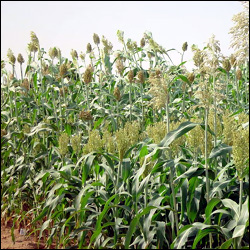
A Field of Sorghum Plants
Basseterre, St. Kitts – Nevis
May 25, 2012 (SKNIS)
The Ministry of Agriculture is working along with regional and international partners to empower small farmers in the Federation.
Dubbed the “CARICOM Food Security Project,” this International Development Research Council (IDRC) funded pilot project forges partnership between the University of the West Indies (UWI), the Caribbean Agricultural Research and Development Institute (CARDI), McGill University in Canada and the Ministry of Agriculture to explore the production of sorghum (a tropical grass similar to corn) as a new type of feed for small ruminant animals raised in St. Kitts and Nevis.
Ansari Hosein, an Agricultural Research Assistant from CARDI’s Headquarters in Trinidad explained the institute’s role in this project.
“What we are trying to do is introduce new, improved forages to St. Kitts, one of which is the forage Sorghum and another is the mulatto grass” said Mr. Hosein. “The plan is to make silage out of them and compare the quality of silage we get from these grasses. Silage is the preservation of forages in as good a nutritional state to the original material. It will never be as good as the original material you put in, you will get some loss in nutrient quality during the ensiling process.”
“You will not notice any difference in growth,” said the Agricultural Assistant, “the quality of the grass will be lower, but the idea of forage conservation is really to have an availability of forage in times of shortage. So if you have an abundance of forage, you don’t need to do silage or forage conservation.”
Another aspect of this project is to measure the feasibility of producing sorghum alongside the already grown mulatto grass in St. Kitts.
“What we are going to do is we’re going to measure the yield per acre per year that you are going to get from forage sorghum and mulatto” said Hosein, “and the nutrient yield from the forage sorghum and mulatto.”
Paul Davis, one of the consultants for the project told the St. Kitts and Nevis Information Service the project’s main objective is to empower farmers to be able to feed their small ruminants all year round.
“The project is trying to find a way to store grass so that farmers will have a constant source of feed rather than having to go through the perennial thing of something to eat in the wet season, nothing to eat in the dry season” Mr. Davis said. “The sorghum here that we started with today is a higher energy crop, slightly more than most grasses, so we’re hoping to get a better quality feed for the goat and the sheep farmers.” “We are hoping also as the main objective, to get small farmers empowered,” explained the consultant, “that they can do this job themselves.”
According to Mr. Davis, this project could also be linked to meat or milk production for small farmers.
“This can go into meat or milk production” said Davis, “so you can have dairy goats, you can have dairy cows, you can have beef animals, and you can have goats and sheep for meat. It is a good opportunity to transition from a sugarcane based economy and bring in small farmers to do animal husbandry, but on a more efficient basis.”
Feeding trials using silage (animal feed) from sorghum and mulatto grasses packaged under this project will be used to compare the growth rate and performance of small ruminants and formulate recommendations to the Ministry of Agriculture.